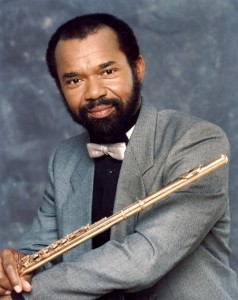Justin’s Japan: Interview with NEA Jazz Master Hubert Laws
By JQ magazine’s Justin Tedaldi (CIR Kobe-shi, 2001-02) for Examiner.com. Visit his NY Japanese Culture page here to subscribe for free alerts on newly published stories.
With a career in music that began in the 1960s, Grammy-nominated flautist Hubert Laws’ latest honor is the NEA Jazz Master Award, which since 1982 is the highest prize the U.S. bestows upon living jazz musicians.
Laws will appear at a free panel discussion with the other 2011 NEA Jazz Masters at New York’s Jazz at Lincoln Center on Jan. 10. (Doors open at 12:45 p.m., and a live video stream can be seen here.) The following night, he will perform at the annual NEA Jazz Masters Awards Ceremony and Concert. For those who can’t attend the sold out show, there will be a live video stream on the NEA website along with a simulcast on the Newark-based WBGO Jazz 88.3 FM and their site, and Sirius/XM Satellite Radio’s Real Jazz Channel 70.
This year also marks the artist’s 40th anniversary of his first trip to Japan. I spoke with him about his time there along with some of his other personal highlights as a musician.
Congratulations on your NEA Jazz Master award. How does it feel to receive this honor?
After learning of its significance, it is a humbling experience to be named among other respected artists of special accomplishment.
How did you find out that you won his award? Did you or anyone else campaign for it?
I happened to be on a tennis court playing doubles when my cell phone rang during a changeover. The gentleman asked if I had a moment—I said, “About 90 seconds.” When he announced the award, I said, “I think my partners will wait a little while longer.” I was not aware of this award, so could not “campaign” for it.
Tell us about your history playing in Japan and working with Japanese artists as a musician.
My first tour in Japan began in Tokyo in 1971 with the “CTI All-Stars” [Freddie Hubbard, Stanley Turrentine, George Benson, Grover Washington, Ron Carter, Bob James, Ester Philips, Hank Crawford and others].
We were greeted at Narita Airport by fans with banners and fanfare as though we were rock stars. That tour included several cities for about two weeks. Since then, 15 other trips there included my own group at the Blue Note Club, another with Ron Carter and his group, Chick Corea and his group, and Sonny Rollins with the Yomiuri Symphony Orchestra, where I premiered the Concertino for Flute and Orchestra by Harold Blanchard. This performance can be seen on the 30 Year Retrospective DVD; and excerpts can be seen on my website. The Laws family [Ronnie, Debra, Eloise and Hubert] appeared at the Cotton Club there in 2007. A JVC Jazz Festival was held there. where Eloise and I appeared there along with Nancy Wilson and others.
My most recent CD features Japanese child prodigy and pianist/keyboardist Yayoi Yoshida in flute adaptations of classical compositions: Rachmaninov’s Piano Concerto #2 and Samuel Barbers’ Adagio for Strings. Excerpts also can be heard on my site.
Why do you think the Japanese enjoy jazz so much?
As a culture, it appears that the Japanese gravitate heavily toward education. This value seemingly leads to appreciation of substance. There is great “substance” in the art of improvised music commonly known as “Jazz.” As in any culture, the “foreign mystique” may also play a part. “A prophet is not unhonored except in his home territory and in his own house.” –Matthew 13:57, New World Translation of Holy Bible.
Click here for the rest of the interview.



Comments are closed.